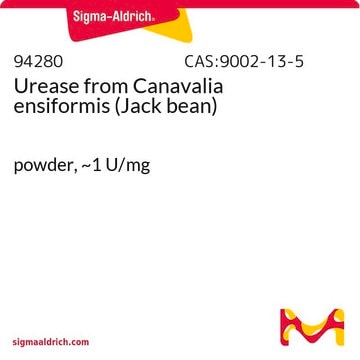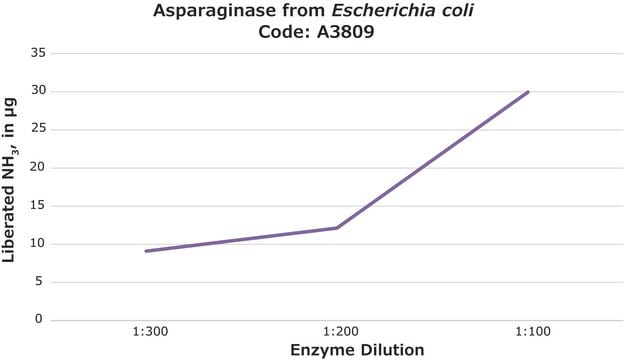A3233
L-Arginase from bovine liver
Protein ≥70 % by biuret, powder
Synonym(s):
L-Arginine amidinase, L-Arginine amidino-hydrolase
Sign Into View Organizational & Contract Pricing
All Photos(3)
About This Item
Recommended Products
biological source
bovine liver
Quality Level
form
powder
specific activity
≥100 units/mg protein
composition
Protein, ≥70% biuret
UniProt accession no.
shipped in
dry ice
storage temp.
−20°C
Gene Information
cow ... ARG2(518752)
Looking for similar products? Visit Product Comparison Guide
General description
L-arginase is also called as L-arginine amidinohydrolase. It exists in two forms, such as arginase-1 and arginase-2. Arginase-1 is present in liver cells and arginase-2 is seen usually in extrahepatic tissues like, kidney, brain, skeletal muscle, small intestine and the lactating mammary gland. Arginase -2 is mapped to human chromosome 14q24.1−24.3.
Biochem/physiol Actions
L-Arginase is the major degradative enzyme for arginine; converts arginine to ornithine; deficiency is associated with spasticity and motor dysfunction.
L-arginase hydrolyze L-arginine into L-ornithine and urea, which is the last step of the urea cycle in the liver of ureotelic species. Arginase plays a major role in the mammalian immune system and the enzyme participates in several aspects of inflammation.
Unit Definition
One unit will cause the hydrolysis of 1.0 μmole of L-arginine per minute at pH 9.5 and 37 °C.
Signal Word
Danger
Hazard Statements
Precautionary Statements
Hazard Classifications
Resp. Sens. 1
Storage Class Code
11 - Combustible Solids
WGK
WGK 1
Flash Point(F)
Not applicable
Flash Point(C)
Not applicable
Personal Protective Equipment
dust mask type N95 (US), Eyeshields, Gloves
Certificates of Analysis (COA)
Search for Certificates of Analysis (COA) by entering the products Lot/Batch Number. Lot and Batch Numbers can be found on a product’s label following the words ‘Lot’ or ‘Batch’.
Already Own This Product?
Find documentation for the products that you have recently purchased in the Document Library.
Customers Also Viewed
Arginase: an emerging key player in the mammalian immune system
Munder M
British Journal of Pharmacology, 158(3), 638-651 (2009)
L-Arginase: a Medically Important Enzyme
Kumar K and Verma N
Research Journal of Pharmacy and Technology, 6(12), 1430-1430 (2013)
Eva Källberg et al.
BMC immunology, 13, 69-69 (2012-12-14)
S100A9 has been shown to be important for the function of so called Myeloid Derived Suppressor Cells (MDSC). Cells with a similar phenotype are also involved in pro-inflammatory processes, and we therefore wanted to investigate the gene expression and function
Yoshinori Narita et al.
Journal of immunology (Baltimore, Md. : 1950), 190(2), 812-820 (2012-12-19)
Evaluation of immune dysfunction during the tumor-bearing state is a critical issue in combating cancer. In this study, we initially found that IL-6, one of the cachectic factors, suppressed CD4(+) T cell-mediated immunity through downregulation of MHC class II by
Abhishek Srivastava et al.
Biochemistry, 52(3), 508-519 (2012-12-29)
Urea producing bimetallic arginases are essential for the synthesis of polyamine, DNA, and RNA. Despite conservation of the signature motifs in all arginases, a nonconserved ¹⁵³ESEEKAWQKLCSL¹⁶⁵ motif is found in the Helicobacter pylori enzyme, whose role is yet unknown. Using
Our team of scientists has experience in all areas of research including Life Science, Material Science, Chemical Synthesis, Chromatography, Analytical and many others.
Contact Technical Service












